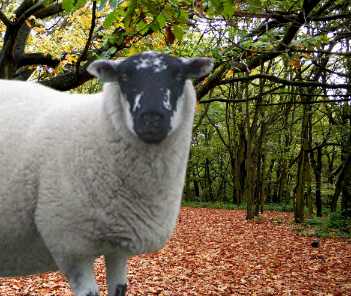The Derbyshire Gritstone sheep is a breed of domestic sheep originated from United Kingdom. It is a very old breed, and is one of the oldest British sheep breeds.
Today the breed is usually found around Cheshire, Derbyshire, Lancashire and Yorkshire. The breed was actually originated from the hills of the Dale of Goyt on the edge of the Peak District around the 1770s.
The farmers in the locality were establishing uniformly in the breed by 1850, aiming at a hardy and disease resistant animal that could withstand the harsh winters on poor ground, produce a lively lamb, which grew well to produce a good carcass and a seleable wool crop.
The Gritstone is strong and resistant to disease and a most economical sheep on high ground.
The average weight of female sheep, also known as ewes, is around 55 to 65 kilograms, whereas male sheep, or rams, typically weigh between 80 to 100 kilograms.
Long bodied with well placed, broad shoulders, good quarters, well sprung ribs with good top and bottom outlines. The body should be well covered with flesh & wool.
Legs are black and white (front legs with black knees and hooves, back legs with black markings down the back of the leg and black hooves), free from wool with good bone, joints and feet well placed at each corner of the body, set wide apart and straight.

Advantages
Clean Wool
The Derbyshire Gritstone sheep boasts a fleece that is not only robust but also remarkably clean. Its wool, a prized possession, finds favor among artisans and craftsmen, ensuring comfort and warmth in various products.
Maternal Excellence
Motherhood is a defining trait of this breed. Derbyshire Gritstone ewes exhibit exceptional maternal instincts, nurturing their offspring with unmatched care. This characteristic enhances the survival rates of lambs, making them strong and resilient from an early age.
Hardy
Nature has endowed the Derbyshire Gritstone sheep with resilience. Adapted to challenging hill terrains, this breed thrives in adverse weather conditions. Its ability to withstand harsh climates and meager grazing resources makes it an invaluable asset for farmers in rugged landscapes.
Low Maintenance
Compared to some other sheep breeds, Derbyshire Gritstone Sheep require minimal maintenance. Their ability to graze on rough forage reduces the need for intensive feeding, making them cost-effective for farmers.
Economical Benefits
From a financial perspective, the Derbyshire Gritstone sheep offers economic advantages. Their ability to thrive on marginal lands reduces the cost of supplementary feeding, making them a cost-effective choice for farmers with limited resources.
Disadvantages
Limited Geographic Distribution
While the Derbyshire Gritstone sheep excels in certain terrains, its geographic range is limited. This restriction hampers its accessibility to farmers in regions where the breed could potentially thrive, but environmental conditions are not conducive.
Limited Commercial Desirability
Despite its exceptional qualities, the Derbyshire Gritstone sheep faces challenges in the commercial market. The demand for this breed is not as widespread as some other commercially popular sheep breeds, affecting its overall market desirability.








0 Comments